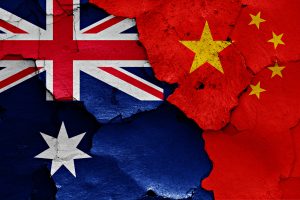The Chinese Communist Party’s (CCP) attempts to reshape the international system escalated last week when it placed “bounties” of $128,000 on the heads of eight Hong Kong democracy activists. Included in the eight were an Australian citizen, Kevin Yam, and Ted Hui, who has been living in Australia since 2021. The bounties represent a new phase in Beijing’s extraterritorial ambitions. These ambitions seek to fundamentally alter our understanding of sovereignty, challenge the globally accepted notion of citizenship, and strike at the very nature of multicultural countries like Australia.
Alongside the bounties placed on democracy advocates, over recent years China has also set up over 100 overseas “police stations” in 53 countries that are used to intimidate and harass members of the Chinese diaspora. There has also been a concerted campaign to target mostly female journalists with Chinese heritage. They are harassed online as “traitors” – with the implication being that they are traitors to their ethnicity. Two Australian citizens, journalist Cheng Lei and writer Yang Hengjun, remain in detention in China on vague charges.
There is now a pressing need to develop a clear-eyed understanding of how the CCP sees the world – or, more accurately, how it sees human beings. The CCP’s name might be dislocating to those bound to the simplicity of the left-right political spectrum, but it is an increasingly weak smokescreen for an ethnic nationalist party. It is increasingly clear that the CCP believes it has jurisdiction over all ethnic Chinese regardless of where they live and regardless of what citizenship they hold. The party expects these people to pay fealty to it and fall in line with its diktats, or face punishment.
This creates a distinct operational clash between China and multicultural liberal democracies like Australia. Under Australian law, democracy advocates, journalists, and writers are doing nothing wrong in exercising their right to express themselves freely. Furthermore, as Australian citizens, their citizenship is what Canberra deems important, not their ethnicity. Yet through the lens of the CCP’s ethnic nationalism, Australia “allowing” people of Chinese heritage to advocate for democracy in Hong Kong, do their jobs as journalists, or otherwise express opinions outside of those deemed acceptable to Beijing, is considered interference in China’s internal affairs.
This could easily be dismissed as petty and ridiculous were it not for China’s emergence as a superpower, its global reach inside countries like Australia, and its widespread integration into the global economy. These circumstances make life incredibly dangerous for people of Chinese heritage, and for countries like Australia with large Chinese diasporas.
In an article published in the Melbourne broadsheet The Age this week, Kevin Yam detailed the complications to his personal life, the care he now has to take with friends and colleagues, and even the limits on items of clothing he chooses to wear, to reduce the spillover of the CCP’s bounty onto others around him.
Yam also worries about the knock-on effects of this bounty on the wider difficulties in Australia’s relationship with China, writing, “As media reports emerged on how my case might cause the prime minister’s visit to Beijing to be derailed, I was hit by pangs of guilt. What if Australian journalist Cheng Lei’s and Australian writer Yang Hengjun’s incarceration is lengthened because of this? What if businesses and workers whose income has been affected by China’s trade sanctions have to wait longer for things to get back to normal?”
However, Yam concluded that “I had to constantly remind myself that I did not create this situation – that the fault lies with an authoritarian China acting like a schoolyard bully.”
Yet it is highly unlikely that the CCP will see themselves in this way. Bullies believe themselves to be victims. They believe they have a “natural right” to control or dominate others, and that any attempt to scrutinize, challenge, or constrain this right is a form of persecution against them. This extends to not just Han Chinese, but also to other ethnicities like Uyghurs and Tibetans that the CCP maintains obsessive control over.
As China’s economy begins to slow, and its population shrinks, it is highly likely that the CCP will double-down on ethnic nationalism as a tool of control and way of maintaining legitimacy. This in turn, will increasingly become a major arm of China’s foreign policy – with the potential for ethnic nationalism to also drive a globally destabilizing invasion of Taiwan.
How Australia navigates this as a threat to a liberal internationalism that at least strives for a non-hierarchical world (even if in practice this isn’t the case), how it resists the counter-movements that may spur other forms of ethnic nationalism, and especially how it protects its citizens from the CCP’s extraterritorial reach, will be a major test of the resilience of Australia’s liberal democracy.

































